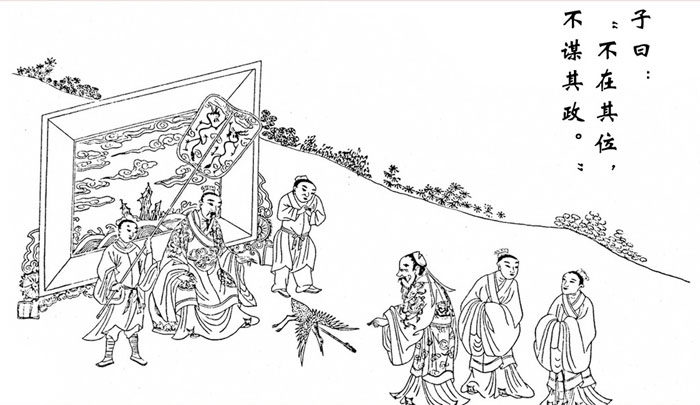12.5 How to govern 2
齊景公問政於孔子。
孔子對曰、君君、臣臣、 父父、子子。
The Duke Jing [Ching], of Qi {Chi], asked Confucius about government.
Confucius replied, ‘There is government, when the prince is prince, and the minister is minister; when the father is father, and the son is son.’
8.5 Mind your own business
子曰、不在其位、不謀其政。
The Master said, ‘He who is not in any particular office, has nothing to do with plans for the administration of its duties.’
10.1 Confucius in village vs. in court
孔子於鄉黨、恂恂如也、似不能言者。
其在宗廟朝廷、便便然、唯謹爾。
Confucius, in his village, looked simple and sincere, and as if he were not able to speak. respectful uneasiness; it was grave, but self-possessed.
When he was in the prince’s ancestorial temple, or in the court, he spoke minutely on every point, but cautiously.
* * *
When everyone is fulfilling their roles in the world, there is family and social order. Otherwise, there is confusion and chaos. For example, in the top-down direction: king taking over the roles of the ministers, managers taking over roles of front-line staffs; in the bottom-up direction: soldiers giving commands to generals, employees making decisions for top management. Therefore, for the purpose of family and social harmony, Confucius advocated people to mind their own business: fulfilling one’s own role, and leave the rest to others. This is the message for the first two sections.
Operational speaking, we have multiple roles in our life. E.g. employee at work, son/daughter to parents, father/mother to kids, friends, teachers/students etc. We need to be flexible and switch when in different roles, like Confucius himself would behave differently at home and at work. This is how we can apply the fluidity of our “self” to fulfill our roles in the world.
You may ask, if the self is so fluid and takes different form. What then is our real identity? The answer is provided in the domain of Taoist and Buddhist teachings.
For spiritual students, minding our own businesses is also an important attitude to cultivate. As the process increasingly draws our attention from the seemingly outer perception to inner reality, we need to stay focused on the internal process of how the world manifests from “within”. We learn to let go of the temptation to interfere with process the mind said to be “out there”, and take responsibility and own the phenomenon as they arise from within. Such is the role for spiritual student.
12.5 君君、臣臣、 父父、子子
齊景公問政於孔子。
孔子對曰、君君、臣臣、 父父、子子。
8.5 不在其位、不謀其政
子曰、不在其位、不謀其政。
10.1 孔子於鄉黨, 朝廷
孔子於鄉黨、恂恂如也、似不能言者。
其在宗廟朝廷、便便然、唯謹爾。
* * *
當大家都在世界上履行自己的角色時,家庭和社會就會有秩序。否则,就会有混淆和混乱。例如,在上而下的方向:国王做部长的角色,经理接管前线员工的角色;在下至上的方向,士兵向将军发出命令,员工为高层管理人员决策。因此,在家庭和社会和谐的目的上,孔子主张的人做好自己的本份,其余的留下给别人。这是前两节的思想。
实际操作来说,我们在生活中有着多个角色,例如工作中是雇员,父母下是儿女,孩子上是父母,朋友,老师/学生等,我们需要灵活的在不同环境切换不同的角色,像孔子自己在家里和在工作中的表现会有所不同。这时,我们可以灵活的运用“自我”的流动性,去履行我们在世界上的角色。
你可能会问,如果“自我”是如变化多端。那么,我们的真实身份又是什么呢?这是道家和佛家的领域。
对于心灵学生而言,做好本份也是一个需要培养的态度。因为,在修道的道路中,我们的注意力会渐渐的从看似外在的世界,回归到内在的感知世界之中。我们要学会放开自心的干扰和诱惑,而将注意力集中在认识自心,和世界如何从自心中显现。这就是心灵学生需要培养的。


Leave a Reply